Back to series
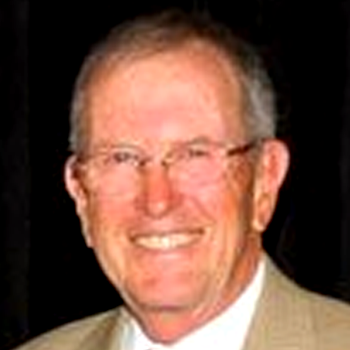

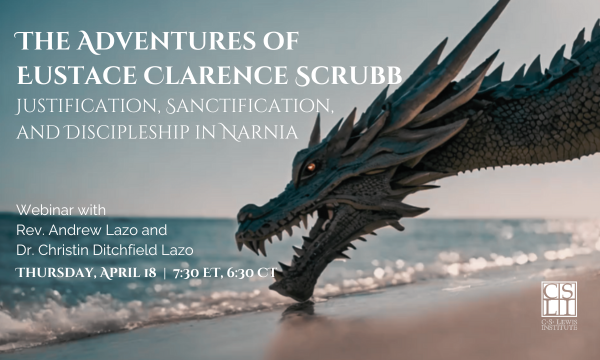
The Legacy of Roy Cook
Click here to open a Print - Friendly PDF
Have you heard of Roy Cook?
Not many people have.
He was a shy person, introspective and withdrawn. At his funeral earlier this year, his best friend said his schoolmates thought he was a nerd. He was often rejected. Once while a teen he thought about strapping himself with bombs and blowing himself up at the school.
It has been my pleasure to be mentored by and to walk with some influential spiritual leaders, including Dick Halverson, Carl F. H. Henry, Jim Houston, Bill Bright, and Charles Malik, all of whom have impacted the nation’s capital in some way.
But I know of no one who has had a more far-reaching ministry of discipleship than Roy Cook. Nor unnoticed.
And, how he did it, can be emulated by any child of God.
 St. Paul was Roy’s model. After Paul had been with new believers in Thessalonica, he wrote them a letter. He applauded these brothers and sisters for being models of Jesus. He reminded them that he and his companions Silvanus (Silas) and Timothy had wanted to be examples for them. “We were gentle among you, like a mother caring for her little children,” he wrote. “We loved you so much that we were delighted to share with you not only the gospel of God but our lives as well” (1 Thess. 2:7–8 NIV).
St. Paul was Roy’s model. After Paul had been with new believers in Thessalonica, he wrote them a letter. He applauded these brothers and sisters for being models of Jesus. He reminded them that he and his companions Silvanus (Silas) and Timothy had wanted to be examples for them. “We were gentle among you, like a mother caring for her little children,” he wrote. “We loved you so much that we were delighted to share with you not only the gospel of God but our lives as well” (1 Thess. 2:7–8 NIV).
Note our lives as well. This verse became Roy Cook’s DNA.
“Roy Cook gave his life for me,” Doug Coe said as he spoke at Roy’s funeral. “He could have become a concert pianist. He was good enough, but he gave it up."
“My mother connived a way to get Roy and me together,” Doug said. “When Roy went off to college in Minnesota, she arranged for us to be roommates. When I quit school and came back to Oregon to marry Jan, Roy quit too.
“When I decided to go back to college at Willamette University in Oregon,” Doug said, “Roy was in a couple of my classes. He’d followed me.”
Doug had throngs of friends at Willamette, but no one was attracted to Roy. Doug liked Roy, because Roy was older and had been a merchant marine. “I liked to hear Roy tell stories,” Doug said.
Loda Coe, Doug’s mother, introduced Roy to Jesus. Dawson Trotman and his friends with the Navigators helped him get his start with a daily practice of time in the Scriptures, prayer, and Scripture memory. He began to read the Bible systematically, book by book, and memorize three verses a week. He continued this discipline all his life, and at one time had cataloged about four thousand verses that he had memorized.
Yet hardly anyone knew of his knowledge of the Word. He never drew attention to himself.
Roy was funny.
A small group of young men in Arlington, Virginia, where Roy lived, asked him to help disciple them. The group met regularly and grew. Some of the men later moved from Arlington to other places in the United States.
But the group wanted to keep meeting, so one year they met on the Eastern Shore of Maryland. About one hundred young men showed up. Kevin Konkal was one of the men. At Roy’s memorial service, Kevin spoke about this gathering.
“During the weekend Roy charged us to see what was happening in the kingdom of God.” Kevin said, “He used the story of Balaam in Numbers 22 to help us understand his point.”
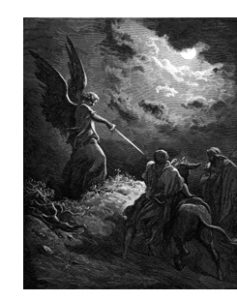 After Roy read the story, Kevin explained that Roy wanted them to see why the donkey had stopped and Balaam had tried to push forward. “‘It was because the donkey saw the kingdom of God,’ Roy said. ‘Balaam didn’t . . . I want to be like Balaam’s ass.’
After Roy read the story, Kevin explained that Roy wanted them to see why the donkey had stopped and Balaam had tried to push forward. “‘It was because the donkey saw the kingdom of God,’ Roy said. ‘Balaam didn’t . . . I want to be like Balaam’s ass.’
“Our whole group said in unison, ‘So do we!’” Kevin said.
From that point on, the men, who spend one weekend a year together, have called themselves the Balaam’s Ass Group.
Roy Cook’s greatest legacy will be lives of men and some women he mentored.
The first man he worked with was Doug Coe. He continued as Doug’s mentor for sixty-eight years.
I have been a partner with these two men and a few others for nearly fifty of these years. Dick Halverson, former chaplain of the US Senate, was also our partner and a mentor to us. He often reminded us that we were to be salt in the earth. “If we do our job well,” he said, “no one will know it.”
Both Roy and Doug have personified this truth. Though Doug has been responsible for much of the leadership behind the scenes at the National Prayer Breakfast, not once in the past fifty years has he stood on the platform. Roy was less visible. More than five decades ago, Doug was invited to sit in on a breakfast with members of the US Senate. He’s been a regular attendee since, but he has spoken but once. Doug has told me that most people perceive the work he does is to be with national and world leaders. But looking back on his life, he says that his time with national and world leaders has taken up “less than 5 percent.” Though making disciples like Jesus has always been the main thrust for both Roy and Doug, the bulk of Doug’s time today is devoted to working with the poor.
Doug and I have been friends and partners in God’s work for forty-nine years. We’ve played lots of golf together and shared a lifetime of heartbreaks and joys. One of the greatest privileges of my life was being asked by Doug to help disciple his son, Jonathan. Then, after Jonathan died of cancer at age twenty-seven, having the privilege of presiding at his memorial service.
Michael Lindsey, author and Rice University sociologist, said the work Doug Coe and his predecessors Abraham Vereide and Dick Halverson have done is, “The most significant spiritual force especially in the lives of leaders in Washington, DC, of any entity I know of. They have sustained more influence over decades than any other entity. There is nothing comparable to them.”
Lindsey’s statements and others like them humor me.
We often call ourselves “western rejects” because Abraham Vereide, Dick Halverson, Doug, and most of us have come from the western states.
Doug likens us to David’s early army of men who were “distressed, discontent, and in debt.” No one, except for Dick Halverson, seemed to be much of a leader. If God has used our little group, it’s because he has a good sense of humor.
That’s not to say Doug has not had influence. He is a man of vision, and doors have continually opened for him with untold leaders all over the world.
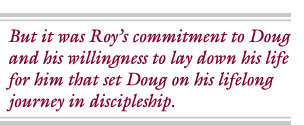 It’s been enjoyable to watch Doug and Roy’s relationship deepen and expand. Doug’s focus in his early days in Washington was twofold: students and national leaders, students being more his passion.
It’s been enjoyable to watch Doug and Roy’s relationship deepen and expand. Doug’s focus in his early days in Washington was twofold: students and national leaders, students being more his passion.
The C. S. Lewis Institute grew out of this student work. Prison Fellowship was another outgrowth.
Congressman and Ambassador Tony Hall’s work in world hunger was another outgrowth.
Doug’s focus changed after he visited Assisi and became an admirer of St. Francis. And later, after Mother Teresa visited us, Doug traveled to India to see her and her work. After that he began putting his energy into helping the poor. Mother Teresa helped all of us see the powerful as poor, too. Strangely, though more attention has been given to the poor since Doug’s trip to Assisi and our times with Mother Teresa, the work with national leaders has grown.
Loda Coe was the person most responsible for Roy Cook becoming a follower of Jesus. She also introduced Doug to Jesus.
But it was Roy’s commitment to Doug and his willingness to lay down his life for him that set Doug on his lifelong journey in discipleship.
Roy, by example, demonstrated to Doug the benefits of Scripture memorization and prayer. Doug was a good student.
Doug is eighty-two today. I saw him at his home recently. He sat in a soft chair. I sat in a matching one close enough that I could grasp his hand. Between us was a shiny coffee table. I noticed he had a stack of three by five white cards, sitting to the rear of the table. I could see a verse of Scripture typed on the top card. The edges of the cards were turned up and well worn.
Doug is still memorizing Scripture. Just like he and Roy did for sixty-eight years. He reads all parts of the Bible, but spends more time in the Gospels because he wants to “think more like Jesus, love more like Jesus, and talk more like Jesus.” For all these years, Roy and Doug gave themselves to loving God with all their hearts. And loving their wives and children, and brothers and sisters in Jesus Christ, “as Jesus loved us.” This was always their supreme purpose in life.
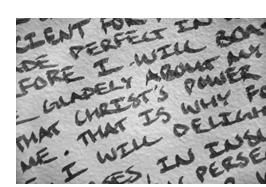 Like Roy, Doug loves the Scriptures, but his goal today is the same as when he and Roy first opened the Word of God together: “make disciples.” Beginning first with himself. Then one or two others. Following Roy’s example, Doug concentrates on just one, or possibly two, men a year and spends his time with them. He does lots of other things, but this is what he feels is the most important thing he does.
Like Roy, Doug loves the Scriptures, but his goal today is the same as when he and Roy first opened the Word of God together: “make disciples.” Beginning first with himself. Then one or two others. Following Roy’s example, Doug concentrates on just one, or possibly two, men a year and spends his time with them. He does lots of other things, but this is what he feels is the most important thing he does.
One of the other things he does is write lots of letters. Has for decades. He signs all of them personally. Often more than a thousand a year. They are mailed to “friends” with whom Doug communicates with in almost all of the 247 nations of the world, having traveled to most of them.
Often he includes some brief “thoughts” in these letters, usually by famous leaders. Many times these “thoughts” are about Jesus.
All the years I’ve worked with him, Doug has been praying that God would raise up laborers in every nation of the world.
It amazes me to think that though Roy Cook is now in heaven, his influence continues in more than two hundred nations, 80 percent of which he never visited.
Not only does Roy’s legacy continue through Doug, but also through Doug’s children, who are many, and through their friends. And through others Roy has mentored, like former Congressman Tony Hall, Governor Sam Brownback, and all those young people who aspire to be like Balaam’s ass.
So what are we to learn about discipleship from the life of this shy, almost unnoticed, follower of Jesus?
Before I address this question, I would like to ask you a question: Who do you believe was the most influential disciple maker among the apostles and disciples of the first century? If you say, “Paul,” we’ll be in agreement. The whole body of Jesus Christ feels the influence of Paul today when we read the New Testament letters, most of which he wrote.
 But would the man who called himself the “chief of sinners,” Saul of Tarsus, ever have been what he became without an Ananias or a Barnabas?
But would the man who called himself the “chief of sinners,” Saul of Tarsus, ever have been what he became without an Ananias or a Barnabas?
Ananias was willing to meet with Saul when every other first-century follower of Jesus feared him. Barnabas, too, sought him out, even traveled long distances to meet with him privately. Later he partnered with him on a journey that would change Paul's identity and launched him into a work of God that would impact every generation for twenty centuries. As I write this story today, I wonder, would we have the Book of Romans or the New Testament as it is without Ananias or Barnabas and their investment in Paul?
I believe God wanted us to have the canon of Scripture we have today; just the same, I’m thankful for the contribution made to Paul by these lesser-known men.
So what are the lessons we learn from Roy Cook’s life?
Most are not new; even so, they are good reminders. These are the four most important to me:
- 1. There is no limit to what God can do if we don’t care who gets the credit.
- 2. Long-range, daily faithfulness in prayer coupled with reading, memorization, and meditation on Scripture reap great gain.
- 3. Investing large amounts of time with one faithful person, possibly more gifted than myself, also has great reward.
- 4. Anyone can love a shy introvert like Roy Cook, as did Loda Coe, and tell him that Jesus has a plan for his or her life; Anyone can give his or her heart to one other person, as did Roy Cook.
May God grant us more witnesses like Loda Coe, who will love the unattractive. And, more faithful disciplers like Roy Cook.

Jim Hiskey
CSLI Co-FounderJim Hiskey, CSLI Co-Founder, is the co-founder of the C.S. Lewis Institute along with Dr. James Houston. Hiskey was a former PGA Tour player and a golf pro. He had been a co-founder of the PGA Tour Fellowship and founder of the Links Letter, which published the testimonies of PGA players and their wives. Hiskey had come to the Washington metro area to work with the National Prayer Breakfast and was involved in founding Cornerstone, a small community of believers in College Park, near the University of Maryland.

 COPYRIGHT: This publication is published by C.S. Lewis Institute; 8001 Braddock Road, Suite 301; Springfield, VA 22151. Portions of the publication may be reproduced for noncommercial, local church or ministry use without prior permission. Electronic copies of the PDF files may be duplicated and transmitted via e-mail for personal and church use. Articles may not be modified without prior written permission of the Institute. For questions, contact the Institute: 703.914.5602 or email us.
COPYRIGHT: This publication is published by C.S. Lewis Institute; 8001 Braddock Road, Suite 301; Springfield, VA 22151. Portions of the publication may be reproduced for noncommercial, local church or ministry use without prior permission. Electronic copies of the PDF files may be duplicated and transmitted via e-mail for personal and church use. Articles may not be modified without prior written permission of the Institute. For questions, contact the Institute: 703.914.5602 or email us.
-
Recent Podcasts
The Side B Stories – Dr. James Tour’s story
by Jana Harmon, James Tour on April 12, 2024From a secular Jewish home, scientific scholar and...Read More
-
Why are Christians so Bad?
by Paul Joen on April 5, 2024
-
Questions That Matter Podcast – Dai Hankey and Gospel Hope for Weary Souls
by Randy Newman, Dai Hankey on April 5, 2024
-
Recent Publications
Isn’t Morality Relative?
by Christopher L. Reese on April 1, 2024It is widely accepted in the Western world...Read More
-
Do Muslims and Christians Worship the Same God?
by Andy Bannister on March 1, 2024
-
Artificial Intelligence and Its Impacts on Humanity
by John Lennox on February 13, 2024
0
All Booked
0.00
All Booked
0.00
All Booked
21934
GLOBAL EVENT: The Adventures of Eustace Clarence Scrubb (CSLI-Atlanta & CSLI-Chicago) 7:30PM ET/ 6:30PM CT
https://www.cslewisinstitute.org/?event=global-event-the-adventures-of-eustace-clarence-scrubb-csli-atlanta-csli-chicago-730pm-et-630pm-ct&event_date=2024-04-18®=1
https://www.paypal.com/cgi-bin/webscr
2024-04-18

Next coming event
Days
Hours
Minutes
Seconds
GLOBAL EVENT: The Adventures of Eustace Clarence Scrubb (CSLI-Atlanta & CSLI-Chicago) 7:30PM ET/ 6:30PM CT
On April 18, 2024 at 7:30 pm Virtual Online EventTags
Speakers
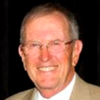
Jim Hiskey
CSLI Co-Founder
Team Members

Jim Hiskey
CSLI Co-FounderJim Hiskey, CSLI Co-Founder, is the co-founder of the C.S. Lewis Institute along with Dr. James Houston. Hiskey was a former PGA Tour player and a golf pro. He had been a co-founder of the PGA Tour Fellowship and founder of the Links Letter, which published the testimonies of PGA players and their wives. Hiskey had come to the Washington metro area to work with the National Prayer Breakfast and was involved in founding Cornerstone, a small community of believers in College Park, near the University of Maryland.




